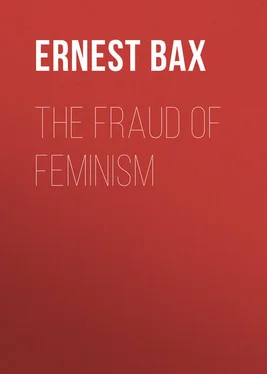Ernest Bax - The Fraud of Feminism
Здесь есть возможность читать онлайн «Ernest Bax - The Fraud of Feminism» — ознакомительный отрывок электронной книги совершенно бесплатно, а после прочтения отрывка купить полную версию. В некоторых случаях можно слушать аудио, скачать через торрент в формате fb2 и присутствует краткое содержание. Жанр: foreign_antique, foreign_prose, на английском языке. Описание произведения, (предисловие) а так же отзывы посетителей доступны на портале библиотеки ЛибКат.
- Название:The Fraud of Feminism
- Автор:
- Жанр:
- Год:неизвестен
- ISBN:нет данных
- Рейтинг книги:3 / 5. Голосов: 1
-
Избранное:Добавить в избранное
- Отзывы:
-
Ваша оценка:
- 60
- 1
- 2
- 3
- 4
- 5
The Fraud of Feminism: краткое содержание, описание и аннотация
Предлагаем к чтению аннотацию, описание, краткое содержание или предисловие (зависит от того, что написал сам автор книги «The Fraud of Feminism»). Если вы не нашли необходимую информацию о книге — напишите в комментариях, мы постараемся отыскать её.
The Fraud of Feminism — читать онлайн ознакомительный отрывок
Ниже представлен текст книги, разбитый по страницам. Система сохранения места последней прочитанной страницы, позволяет с удобством читать онлайн бесплатно книгу «The Fraud of Feminism», без необходимости каждый раз заново искать на чём Вы остановились. Поставьте закладку, и сможете в любой момент перейти на страницу, на которой закончили чтение.
Интервал:
Закладка:
The underlying assumption of the suffrage movement may therefore be taken to be the average equality of the sexes as regards intellectual value. 2 2 I believe there are some Feminist fanatics who pretend to maintain the superiority of the female mind, but I doubt whether this thesis is taken seriously even by those who put it forward. In any case there are limits to the patent absurditie which it is worth while to refute by argument.
An initial difficulty exists in proving theoretically the intellectual inferiority of women to men, or even their relative unsuitability for fulfilling functions involving a special order of judgment. There are such things as matters of fact which are open to common observation and which none think of denying or calling in question unless they have some special reason for doing so. Now it is always possible to deny a fact, however evident it may be to ordinary perception, and it is equally impossible to prove that the person calling in question the aforesaid evident fact is either lying (or shall we say is “prevaricating”), or even that he is a person hopelessly abnormal in his organs of sense-perception.
At the time of writing, the normal person who has no axe to grind in maintaining the contrary, declares the sun to be shining brightly, but should it answer the purpose of anyone to deny this obvious fact, and declare that the day is gloomy and overcast, there is no power of argument by which I can prove that I am right and he is wrong. I may point to the sun, but if he chooses to affirm that he doesn’t see it I can’t prove that he does. This is, of course, an extreme case, scarcely likely to occur in actual life. But it is in essence similar to those cases of persons (and they are not seldom met with) who, when they find facts hopelessly destructive of a certain theoretical position adopted by them, do not hesitate to cut the knot of controversy in their own favour by boldly denying the inconvenient facts. One often has experience of this trick of controversy in discussing the question of the notorious characteristics of the female sex. The Feminist driven into a corner endeavours to save his face by flatly denying matters open to common observation and admitted as obvious by all who are not Feminists. Such facts are the pathological mental condition peculiar to the female sex, commonly connoted by the term hysteria; the absence, or at best the extremely imperfect development of the logical faculty in most women; the inability of the average woman in her judgment of things to rise above personal considerations; and, what is largely a consequence of this, the lack of a sense of abstract justice and fair play among women in general. The aforesaid peculiarities of women, as women, are, I contend, matters of common observation and are only disputed by those persons – to wit Feminists – to whose theoretical views and practical demands their admission would be inconvenient if not fatal. Of course these characterisations refer to averages, and they do not exclude partial or even occasionally striking exceptions. It is possible, therefore, although perhaps not very probable, that individual experience may in the case of certain individuals play a part in falsifying their general outlook; it is possible – although, as I before said not perhaps very probable – that any given man’s experience of the other sex has been limited to a few quite exceptional women and that hence his particular experience contradicts that of the general run of mankind. In this case, of course, his refusal to admit what to others are self-evident facts would be perfectly bona fide . The above highly improbable contingency is the only refuge for those who would contend for sincerity in the Feminist’s denials. In this matter I only deal with the male Feminist. The female Feminist is usually too biassed a witness in this particular question.
Now let us consider the whole of the differentiations of the mental character between man and woman in the light of a further generalisation which is sufficiently obvious in itself and which has been formulated with special clearness by the late Otto Weininger in his remarkable book, “Geschlecht und Charakter” (Sex and Character). I refer to the observations contained in Section II., Chaps. 2 and 3. The point has been, of course, previously noted, and the present writer, among others, has on various occasions called special attention to it. But its formulation and elaboration by Weininger is the most complete I know. The truth in question consists in the fact, undeniable to all those not rendered impervious to facts by preconceived dogma, that, as I have elsewhere put it, while man has a sex, woman is a sex. Let us hear Weininger on this point. “Woman is only sexual, man is also sexual. Alike in time and space this difference may be traced in man, parts of his body susceptible to sexual excitement are small in number and strictly localised. In woman sexuality is diffused over the whole body, every contact on whatever part excites her sexually.” Weininger points out that while the sexual element in man, owing to the physiological character of the sexual organs, may be at times more violent than that in woman, yet that it is spasmodic and occurs in crises separated by intervals of quiescence. In woman, on the other hand, while less spasmodic, it is continuous. The sexual instinct with man being, as he styles it, “an appendix” and no more, he can raise himself mentally entirely outside of it. “He is conscious of it as of something which he possesses but which is not inseparate from the rest of his nature. He can view it objectively. With woman this is not the case; the sex element is part of her whole nature. Hence, it is not as with man, clearly recognisable in local manifestations, but subtly affects the whole life of the organism. For this reason the man is conscious of the sexual element within him as such, whereas the woman is unconscious of it as such. It is not for nothing that in common parlance woman is spoken of as ‘the sex.’ In this sexual differentiation of the whole life-nature of woman from man, deducible as it is from physiological and anatomical distinctions, lies the ground of those differentiations of function which culminate in the fact that while mankind in its intellectual, moral and technical development is represented in the main by Man, Woman has continued to find her chief function in the direct procreation of the race.” A variety of causes, notably modern economic development, in their effect on family life, also the illegitimate application of the modern democratic notion of the equality of classes and races, to that of sex, has contributed to the modern revolt against natural sex limitations.
Assuming the substantial accuracy of the above statement of fact, the absurdity and cheapness of the clap-trap of the modern “social purity” monger, as to having one and the same sexual morality for both sexes will be readily seen. The recognition of the necessity of admitting greater latitude in this respect to men than to women is based clearly on physiology and common-sense. With men sexual instinct manifests itself locally, and at intervals its satisfaction is an urgent and pressing need. With woman this is not so. Hence the recognised distinction between the sexes in this respect is, as far as it goes, a thoroughly sound one. Not that I am championing the severity of the restrictions of the current sexual code as regards women. On the contrary, I think it ought to be and will be, in a reasonable society of the future, considerably relaxed. I am only pointing out that the urgency is not so great in the one case as in the other. And this fact it is which has led to the toleration of a stringency, originally arising mainly from economic causes (questions of inheritance and the like), in the case of women, which would not have been tolerated in that of men, even had similar reasons for its adoption in their case obtained. Any successful attempt of social purity mongers to run counter to physiology in enforcing either by legislation or public opinion the same stringency on men in this respect as on women could but have the most disastrous consequences to the health and well-being of the community.
Читать дальшеИнтервал:
Закладка:
Похожие книги на «The Fraud of Feminism»
Представляем Вашему вниманию похожие книги на «The Fraud of Feminism» списком для выбора. Мы отобрали схожую по названию и смыслу литературу в надежде предоставить читателям больше вариантов отыскать новые, интересные, ещё непрочитанные произведения.
Обсуждение, отзывы о книге «The Fraud of Feminism» и просто собственные мнения читателей. Оставьте ваши комментарии, напишите, что Вы думаете о произведении, его смысле или главных героях. Укажите что конкретно понравилось, а что нет, и почему Вы так считаете.












